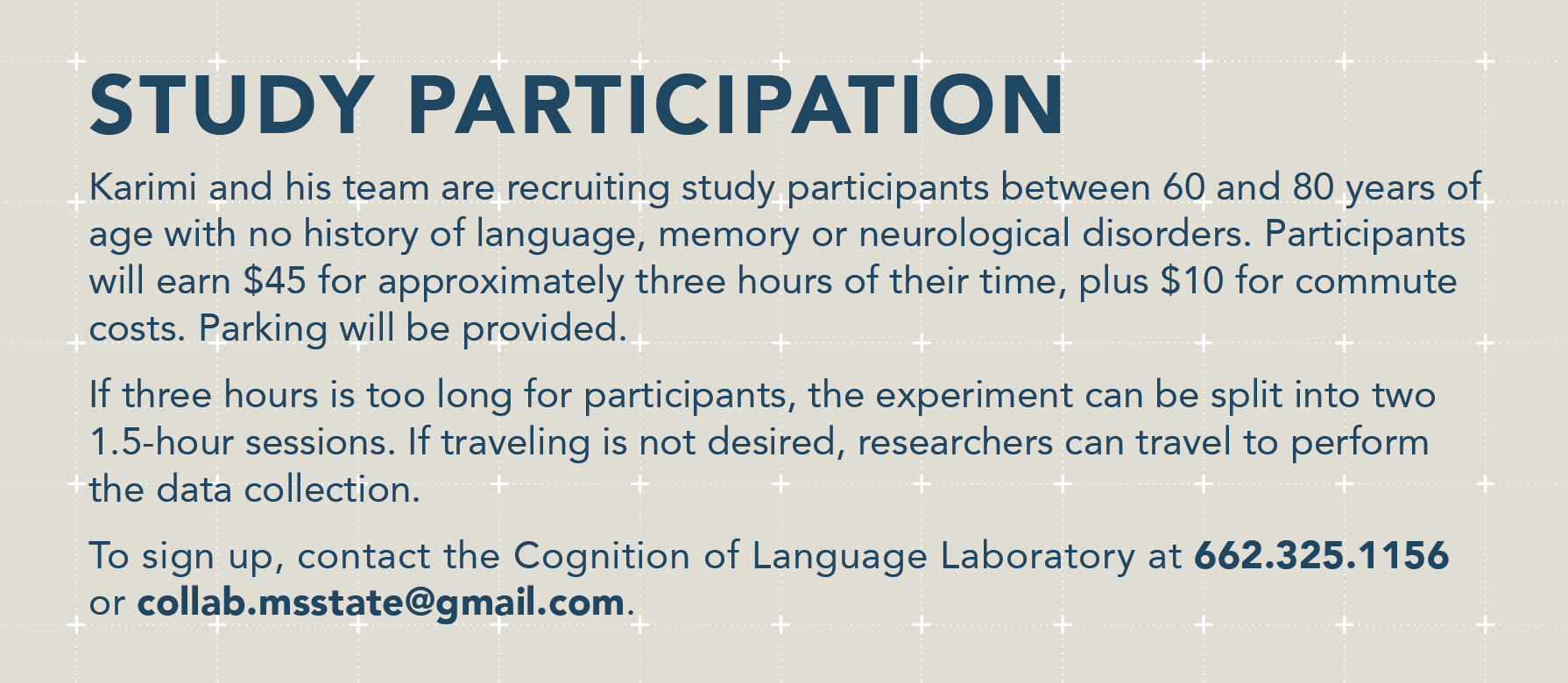For every aging adult, there comes a time when routine physical tasks become a challenge. For some adults, it’s a walk up the steps that now requires a handrail. For others, it’s time spent tending a garden that now requires days for the knees to recover.
While those new physical realities are expected, aging adults also must adjust to new, often unforeseen, cognitive struggles. It might mean a word remains “on the tip of the tongue” longer as one searches for the right syllables, or a long-held memory might stay just beyond one’s grasp when storytelling.
To better understand these age-related cognitive function and language processing changes, Mississippi State University’s Hossein Karimi is leading a National Institutes of Health-funded study of the aging mind. The study’s findings could help improve therapies for cognitive decline.
“We know that working memory declines with age, so we’re studying to see how exactly these effects impact language processing and the key differences among people as they age,” explained Karimi, an assistant professor in MSU’s Department of Psychology.
The study aims to recruit 300 participants age 25-59 and 300 adults age 60-80 who have not been diagnosed with Alzheimer’s, dementia or other diseases that impact memory. Participants perform simple language and memory-related tasks on a computer, and might also have their brain wave activity recorded through an electroencephalogram test.

Karimi explained language recognition can begin before birth, with babies and small children gradually acquiring more language and eventually growing into adults who can rapidly read, write and process speech. However, some aspects of cognitive decline may start as early as age 25. The good news, Karimi said, is that for a few decades the decline is very mild and has minimal impacts on mental function. However, around age 60, the pace of that brain shrinkage increases, which impacts the ability to process language, store information and focus attention.
“An older brain may lose the ability to predict what word comes next, but more significantly it can struggle to assemble the sounds that make a word,” said Karimi, who joined MSU as a faculty member in 2020. “If they are trying to retrieve a word related to big cats, and they are looking for ‘lion,’ a semantic neighbor, they may make a mistake and say ‘tiger.’ If there is an infrequent word, they know the word and the meaning of it, but it is harder for them to assemble the sound. That is why the ‘tip of the tongue’ phenomenon is significantly more common with older adults.”
Karimi’s research team includes Jaden Zinn, a doctoral student in the psychology program who completed his bachelor’s at MSU in 2022. The Washington native said he realized as an undergraduate that studying and researching with Karimi in the cognitive science program would be a good fit for his interest in psychology and linguistics.

“It’s kind of cliche but, you know, everything is language,” Zinn said. “Any kind of communication— as mass media advertising, doctors talking to patients, teachers trying to help people understand stuff, all of that comes down to language. If you know how to best use language and memory to help people understand the concepts they’re trying to communicate, that is a very big skill.”
The researchers said, so far, many study participants have been surprised by how well they perform on memory and language tests and appreciate having a baseline for their mental function. Karimi noted studies like this can point to early signs of diseases such as Alzheimer’s and dementia. An earlier diagnosis can allow doctors to slow the progression of the diseases, giving patients more time to enjoy the world with their mental faculties intact.
While the study may not be directly related to diseases that become common in aging adults, Karimi said foundational science like this can yield considerable societal benefits as a building block for medical knowledge.
“I believe that the results that we’re going to obtain will eventually be helpful to us as a society by improving the understanding of how the brain works, how memory works, how attention works, and how all of that influences language processing,” Karimi said.

Stay Sharp At Any Age
Every adult wants to stay mentally sharp well into old age, but ultimately everyone is working against biological factors as time goes on. However, Hossein Karimi, an assistant psychology professor, said there are simple things people can do to help slow memory and brain function loss. Mostly, he said, its keeping your brain engaged with things like puzzles and books. It also helps to exercise and maintain healthy eating habits, which can slow down physical and mental decline.
Karimi’s graduate student, Jaden Zinn, said reading a book is a great way to keep the brain engaged, explaining that process requires mental functioning at a high level.
“You have to keep track of tons of details—what characters look like, what already happened in the story—and your brain is simultaneously making predictions of what you think will happen in the story,” Zinn said. “So your knowledge of tropes and literature comes into play. While reading can make you better at language, it can also make you better at a bunch of different things.”
Karimi and Zinn both cautioned against consumer products that claim to use memory training techniques to improve cognitive functioning, as they are often not backed by evidence from research.



